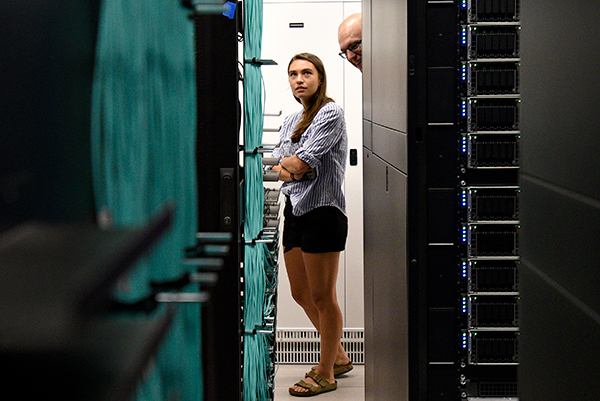The fifth-most-powerful supercomputer in the world, known as Frontera, launched Tuesday during a dedication ceremony at the Texas Advanced Computing Center.
Dan Stanzione, executive director of TACC, said Frontera is also the fastest supercomputer at any university in the U.S. The computer performs at double the rate of the current flagship supercomputer on campus, Stampede2, project co-principal investigator John West said.
West said unlike other supercomputers,hFrontera can perform both large and small calculations in a short amount of time. Frontera was built in early 2019 and is the fourth top-15 system TACC has built in the past decade, according to a University press release.
"(Frontera) is really specifically designed for those very large problems that users can ask the computer to run and not have to wait a long time to get an answer back," West said. "These systems are really useful to all kinds of science."
Stanzione said different tech companies, such as Intel, Dell and NVIDIA, along with professionals from TACC and the National Science Foundation, collaborated on Frontera's development and construction.
"There are about 140 professionals at TACC, and most of them have been involved in one way or another in writing the proposal, doing the design, putting the computer together and then tuning it and configuring it to make it work," West said. "The whole center touches a system this big to get it working and get it working well for users."
Shashankk Subramanian, a computational science, engineering and mathematics graduate student, and postdoctoral fellow Klaudius Scheufele said they use the Frontera system to gather data about a specific kind of brain tumor that cannot be fully imaged with a typical MRI.
"We can't see all the information about the tumor from MRIs, like how far it's infiltrated into healthy tissues," Subramanian said. "Biophysical models combined with superscaled computation methods (such as those in Frontera) can assist in making better clinical decisions."
Supercomputers have applications in a wide range of disciplines, from assisting in the study of viruses to creating simulations to predict gravitational waves emitted by neutron stars, Stanzione bsaid.
"To me, the most impressive aspect of Frontera is the vast scope of researching it supports," said Fleming Crim, COO of the National Science Foundation. "It works to secure our nation's leadership across a wide range
of disciplines."















